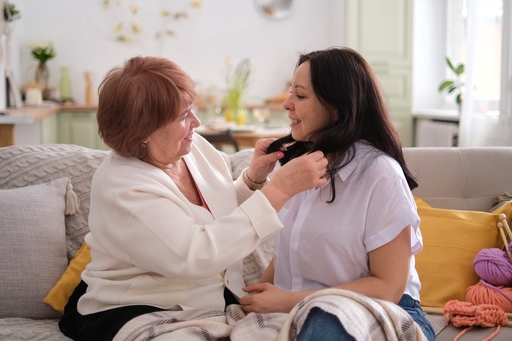Exceptional dementia care at home for over 60 years
Dementia care at home
Caring for a loved one with dementia can be a challenging journey that requires not only compassion and dedication but also a deep understanding of the condition. At Consultus Care and Nursing, we understand the complexities of dementia, and are committed to providing highly personalised live-in care that ensures your loved one receives the support they need, all from the familiar and comforting environment of their own home. With our experienced carers by their side, your loved one can continue to live with dignity and respect, surrounded by the memories and routines that are so essential to their well-being.

What is dementia?
Dementia is a broad term used to describe a range of neurological conditions that lead to a progressive decline in cognitive function. This decline can affect memory, thinking, problem-solving, and even personality and behaviour. The most common form of dementia is Alzheimer’s disease, but there are many other forms, including vascular dementia, Lewy body dementia, and frontotemporal dementia. Each type affects the brain in different ways, but all forms of dementia are life-altering, both for the individual and for those who care for them.
Dementia is more than just forgetfulness. It can make simple daily tasks increasingly difficult and confusing, and it often brings significant emotional challenges, both for the person experiencing dementia and for their loved ones. Understanding dementia and how it impacts an individual is crucial to providing the appropriate care and support needed to help those affected live a good quality of life.
Talk to us today
Give us a call to discuss your needs with one of our friendly, expert Care Advisors. They will guide you through your options to ensure you make the right choice for you and your family.
Caring for different types of dementia
Each type of dementia requires a personalised approach to care, reflective of the unique symptoms faced by the individual.
Alzheimer’s Disease often begins with mild memory loss and progresses to more severe cognitive impairments, such as difficulty with language, disorientation, and changes in mood or behaviour. Caring for someone living with Alzheimer's involves creating a structured routine to help reduce confusion, using memory aids like labels or calendars, and offering reassurance and patience, especially as the disease advances. It is important to provide a safe environment, as individuals may become more prone to wandering and accidents
Vascular Dementia presents differently depending on the areas of the brain affected by disrupted blood flow, often following strokes. Symptoms might include problems with planning, decision-making, slowed thinking, and mood changes. Caring for a person living with vascular dementia focuses on managing cardiovascular health to prevent further strokes, maintaining a healthy diet, and providing cognitive exercises to stimulate the brain. Supporting the individual’s emotional well-being is also crucial, as depression is common with this type of dementia.
Lewy Body Dementia can cause a mix of symptoms, including memory loss, visual hallucinations, and motor symptoms similar to those experienced with Parkinson’s disease. Individuals may experience fluctuations in attention and alertness, sometimes appearing confused and at other times relatively normal. Caring for someone living with Lewy Body Dementia requires sensitivity to these fluctuations and providing a calm, well-lit environment to reduce the likelihood of hallucinations. It is also important to work closely with healthcare providers to manage movement symptoms and avoid medications that could worsen them.
Frontotemporal Dementia (FTD) primarily affects behaviour and language, leading to significant changes in personality, social conduct, and communication. Those with FTD may exhibit impulsive or socially inappropriate behaviour. Caring for FTD involves creating a predictable daily routine and using clear, simple language for communication. Carers should focus on maintaining a calm environment and providing activities that the individual finds engaging, while also being patient and understanding of behavioural changes.
Mixed Dementia involves a combination of two or more types of dementia, such as Alzheimer’s and vascular dementia, leading to a broader range of symptoms. Caring for mixed dementia requires a holistic approach that addresses the specific symptoms of each type involved. This might include a combination of memory aids, cardiovascular health management, and emotional support. Flexibility and adaptability in care are key, as the presentation can vary widely.
Different stages of dementia
Dementia is a progressive condition, meaning the level of care needed will change over time. We are here to support your loved one through every stage of their dementia journey, ensuring that their needs are met with compassion at each phase.
Early stage dementia care: In the early stages, your loved one may still be quite independent, but they may need support with managing daily tasks and staying organised. Our carers focus on helping them maintain their independence for as long as possible, offering assistance with medication reminders, meal preparation, and encouraging activities that keep the mind active. This stage is also about building a trusting relationship between the carer and your loved one, ensuring that they feel comfortable and supported.
Mid stage dementia care: As dementia progresses, your loved one may begin to experience more pronounced symptoms, such as increased confusion, memory loss, and changes in behaviour. Our carers provide more hands-on support during this stage, helping with personal care, managing behavioural changes, and ensuring that your loved one’s safety is prioritised
Late stage dementia care: In the later stages of dementia, care needs can become much more intensive. Your loved one may require full assistance with all aspects of daily life, including feeding, mobility, and personal hygiene. Our carers are trained to provide this level of care with the utmost respect and dignity, ensuring that your loved one is comfortable and well-cared-for. A person at this stage of dementia may have increased healthcare needs. Our carers trained to monitor changes in health, and identify anything that could result in hospital admission. Consultus provide live-in nurses who can provide greater healthcare support around-the-clock at this stage, including compassionate palliative/end-of-life care.

How does dementia care support your loved one?
Our live-in dementia care service is comprehensive and fully personalised to meet the needs of your loved one. Our care covers all aspects of daily life, providing both practical assistance and emotional support to ensure the best possible quality of life. Our trained carers work closely with you and your family to develop a bespoke care plan that evolves as your loved one’s condition progresses.
Our dementia care typically includes:
Sensitive personal care: Assistance with daily activities such as washing, dressing, and grooming, helping your loved one maintain their personal hygiene and dignity.
Medications support: If you receive care from a carer we introduce to you, whilst they are trained to support a person with their medications, we do not manage or oversee medication regimes. With our fully managed service, carers are trained in medications management and there is oversight from your Care Consultant, which is beneficial particularly if you have a complex medications regime.
Planning and cooking meals: Our carers can prepare your favourite meals and snacks, ensuring preferences and nutritional needs are met.
Companionship and emotional support: Carers are carefully matched to make sure that similar values and interests are shared. They will provide companionship and understanding, which can help to manage the emotional and psychological challenges that often present.
Mobility support: Our carers are trained in helping your loved one move safely around their home. Whether that is supporting them to walk, helping them in and out of bed, or using mobility aids to prevent falls and maintain as much independence as possible.
Housekeeping tasks: Our carers will undertake domestic tasks such as cleaning and laundry, making sure your home is a safe and comfortable place to live.
Caring for pets: With help from your carer, your furry friend will continue to receive daily exercise and meals.
Benefits of live-in dementia care
When it comes to choosing the best care option for your loved one, deciding between live-in care at home and moving into a residential care or nursing home is a significant decision. Live-in dementia care offers several advantages over receiving care in a care home setting, particularly in terms of quality of life and the level of personalised attention your loved one will receive.
Familiar environment: One of the most important benefits of live-in care for someone living with dementia is that you can remain in your own home. Familiar surroundings can significantly reduce confusion and anxiety, which are common for those living with dementia. The home is filled with memories, personal belongings, and a routine that is both comforting and reassuring.
Enhanced quality of life: Your loved one can maintain a greater level of independence and enjoy the comfort of their own home while receiving the expert care they need. This approach fosters a sense of dignity and respect that can be lost in more institutional settings.
Personalised one-to-one support: In a nursing home, care is often shared among residents at an average ratio of 1:4 in the UK. With live-in care, your loved one receives dedicated, one-to-one attention from a carer who gets to know them personally. This allows for a highly tailored approach to care that is specifically designed to meet their needs, preferences, and routines.
Continuity of care: Maintaining a consistent routine is vital for someone living with dementia, as it helps to create a sense of security and stability. Live-in care ensures that these routines are preserved, and any changes can be introduced gradually and sensitively, reducing the stress that often arises from significant changes in environment or daily life.
Family involvement: Live-in care enables family members to remain closely involved in their loved one’s care. You can continue to play an active role in their life, without the restrictions often imposed by residential home schedules and protocol
For couples: Live-in care for couples enables life partners to remain together, receiving care in a familiar environment. With residential care, couples are often split up, with few providers offering shared accommodation
How we provide dementia care at home
At Consultus Care, we offer three distinct live-in care services for those requiring dementia care at home. We are committed to ensuring our clients receive the right level of care that meets their needs, whilst providing choice as to how their care arrangement is managed.

Introductory live-in care
With our introductory live-in care service, we recruit a self-employed carer who works in your home for you, independently of us. In contrast to our managed live-in care service, with introductory care, we do not direct, supervise or manage the carers we introduce to you, and the carers are paid directly by you.

Managed live-in care
Our fully managed live-in care service is regulated by the Care Quality Commission (CQC) in England, which results in regular inspections to ensure the care we provide is of the highest standard. We fully manage the service, which means carers are supervised, managed and monitored by us when working in a client’s home.

Live-in nursing
Our live-in nurses are fully qualified registered nurses, with a minimum of three years post qualification experience. They are carefully selected for their specific skills and knowledge and have a broad range of experience including community and acute nursing, and palliative care.
Why choose Consultus Care and Nursing?
One of the longest-established and most trusted providers
Founded in 1962, we have always been innovators in live-in care and live-in nursing. With over 60 years’ experience, we are one of the country’s longest-established, most highly recommended and experienced providers.
Unrivalled choice and control over your care
We understand that every person’s needs are different and every family’s situation is unique. With our choice of fully managed live-in care and nursing, and our introductory service, we offer more flexibility and personalisation than any other provider.
Highly trained nurses and carers
We are nationally recognised for the quality of our nurses and carers. With market-leading training, delivered at our own, multi-award-winning training centre, they provide exemplary, compassionate care tailored to individual needs, offering total peace of mind for clients and their families.
Expert care and support, dedicated to you
Our Care Consultants oversee our nursing and managed care services supporting only a small number of families. This means our service is truly personal, with unrivalled support and continuity of care. Reassurance that we are there when you need us most.
Family-founded, family-owned
We continue to be a family-owned and family-managed business. The largest wholly family-owned live-in care provider in the UK, we focus on what our clients and their families need from a high-quality care service, not on meeting investors’ expectations.

What our clients say
"Najma was absolutely amazing. She arrived and took stock of the situation lining up all the support he needed. Najma meant that my father could stay in his own home, as he wanted. She was so kind to him and us. I don’t think we could have managed without her ."

How much does dementia care at home cost?
The cost of live-in dementia care varies depending on the level of care required and the specific needs of your loved one. We are committed to providing clear pricing and believe that exceptional care should be accessible and straightforward to understand. We offer competitive rates with no hidden fees, ensuring that you know exactly what to expect.
We understand that navigating the costs of care can be overwhelming, which is why we are here to support you in exploring your options and to find a solution that works for your family. For a personalised quote and to discuss your loved one’s needs in more detail, please contact us. Our compassionate Care Consultants are on hand to guide you through the process and ensure that you find the right care solution.
Learn more about our dementia services
Download our brochure
To find out more about our award-winning live-in care services, download our brochure below.
Looking for care?
Please fill out the enquiry form below and we will aim to contact you within 24 hours. Looking to work for Consultus Care and Nursing? Please apply here.


.png?aspect-ratio=131%3A89)

